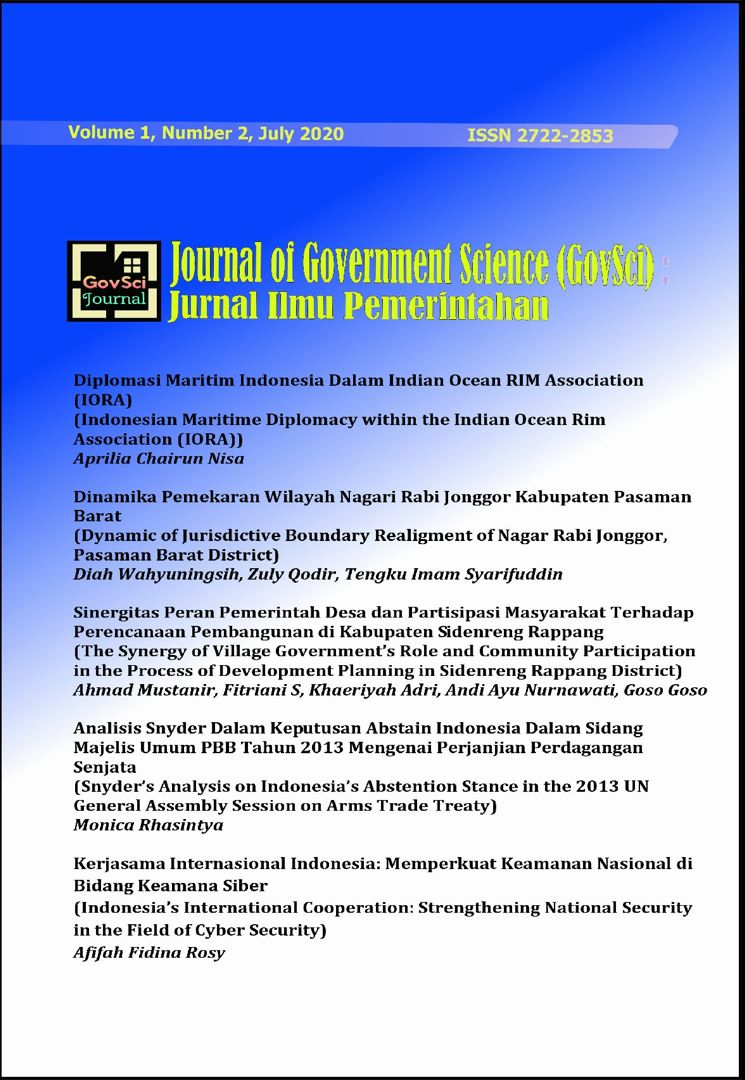Analisis Snyder dalam Keputusan Abstain Indonesia dalam Sidang Majelis Umum PBB Tahun 2013 mengenai Perjanjian Perdagangan Senjata Snyder’s Analysis on Indonesia’s Abstention Stance in the 2013 UN General Assembly Session on Arms Trade Treaty
Abstract
Illegal circulation of Small Arms and Light Weapons (SAWL) motivates countries to discuss the legal bindings needed to be devised to overcome them. The formulation of controlling SAWL consisted of various stages and processes which eventually formed the Arms Trade Agreement and were tried at the UN General Assembly session in 2013. Indonesia, which initially supported the existence of legal instruments to oversee the movement of the SAWL, decided to abstain. Using the literature study method, this research intends to explain the reasons for Indonesia's abstention and to analyze the decision-making process using Snyder's perspective.
Keywords: decision making, national interests, arms trade treaty, small arms, Indonesia
References
AK, Syahmin, dan Fidelia, “The International Cooperation to Eradicate Illicit Firearms Trafficking in Southeast Asian Region,” Sriwijaya Law Review, 2.2 (2018), 186
Djumati, Ninggimus Yolemal, Lengkong, Johny P., Tulung, Trilke E., “Kebijakan Politik Luar Negeri Indonesia pada Pemerintahan Jokowi dalam Upaya Penyelesaian Konflik di Myanmar,” Politico, 9.1 (2020)
Hartono, Budi. “Analisa Teori Pilihan Rasional Mengenai Sikap Abstain Indonesia Dalam Perjanjian Perdagangan Senjata ( Arms Trade Treaty / Att ) Tahun 2013,” 3
Jonesti, Putri, dan Saeri,M “Kebijakan Indonesia Abstain dalam Arms Trade Treaty Tahun 2013,” Jom Fisip, 3.2 (2016), 6
Kementrian Luar Negeri Republik Indonesia, “Isu Senjata,” Isu Khusus, 2019
Malhotra, Aditi, “Globalisation And The Illicit Trade Of Small Arms And Light Weapons,” 2015
Mochamad, yanyan yani, “Politik Luar Negeri,” 8–9
Ozkececi-Taner, Ranan D. Kuperman and Binnur, “Making Research on Foreign Policy Decision Making More Dynamic A Dynamic Framework for Analyzing Foreign Policy,” International Studies Review, 8.3 (2006), 537–44
Putra, Ibnu Pratama, “Politik Luar Negeri Indonesia terhadap malaysia dalam Mempertahankan Kepemilikan terhadap Blok Ambalat Pasca Konflik Pulau Sipadan dan Ligitan,” Jom Fisip, 3.2 (2016), 4
Qonita, Maulida Ibnaty, “Analisis Perubahan Kebijakan Luar Negeri Korea Selatan Dalam Pemasangan Sistem Terminal High Altitude Area Defense (THAAD),” Journal of International Relations, 5.4 (2019), 790–800
Sears, Nathan A., “Controlling Small Arms and Light Weapons Proliferation: The Potential of the Arms Trade Treaty,” Paterson Review of International Affairs, 12 (2012), 37–42
W, Denik Iswardani, “Diplomasi Indonesia Terhadap Perjanjian Perdagangan Senjata (Arms Trade Treaty) Pada Sidang Majelis Umum Pbb Tahun 2013,” Jurnal Pertahanan & Bela Negara, 4.2 (2014), 127–44
Djumati, Ninggimus Yolemal, Lengkong, Johny P., Tulung, Trilke E., “Kebijakan Politik Luar Negeri Indonesia pada Pemerintahan Jokowi dalam Upaya Penyelesaian Konflik di Myanmar,” Politico, 9.1 (2020)
Hartono, Budi. “Analisa Teori Pilihan Rasional Mengenai Sikap Abstain Indonesia Dalam Perjanjian Perdagangan Senjata ( Arms Trade Treaty / Att ) Tahun 2013,” 3
Jonesti, Putri, dan Saeri,M “Kebijakan Indonesia Abstain dalam Arms Trade Treaty Tahun 2013,” Jom Fisip, 3.2 (2016), 6
Kementrian Luar Negeri Republik Indonesia, “Isu Senjata,” Isu Khusus, 2019
Malhotra, Aditi, “Globalisation And The Illicit Trade Of Small Arms And Light Weapons,” 2015
Mochamad, yanyan yani, “Politik Luar Negeri,” 8–9
Ozkececi-Taner, Ranan D. Kuperman and Binnur, “Making Research on Foreign Policy Decision Making More Dynamic A Dynamic Framework for Analyzing Foreign Policy,” International Studies Review, 8.3 (2006), 537–44
Putra, Ibnu Pratama, “Politik Luar Negeri Indonesia terhadap malaysia dalam Mempertahankan Kepemilikan terhadap Blok Ambalat Pasca Konflik Pulau Sipadan dan Ligitan,” Jom Fisip, 3.2 (2016), 4
Qonita, Maulida Ibnaty, “Analisis Perubahan Kebijakan Luar Negeri Korea Selatan Dalam Pemasangan Sistem Terminal High Altitude Area Defense (THAAD),” Journal of International Relations, 5.4 (2019), 790–800
Sears, Nathan A., “Controlling Small Arms and Light Weapons Proliferation: The Potential of the Arms Trade Treaty,” Paterson Review of International Affairs, 12 (2012), 37–42
W, Denik Iswardani, “Diplomasi Indonesia Terhadap Perjanjian Perdagangan Senjata (Arms Trade Treaty) Pada Sidang Majelis Umum Pbb Tahun 2013,” Jurnal Pertahanan & Bela Negara, 4.2 (2014), 127–44
Authors
Analisis Snyder dalam Keputusan Abstain Indonesia dalam Sidang Majelis Umum PBB Tahun 2013 mengenai Perjanjian Perdagangan Senjata: Snyder’s Analysis on Indonesia’s Abstention Stance in the 2013 UN General Assembly Session on Arms Trade Treaty. (2020). Journal of Government Science (GovSci) : Jurnal Ilmu Pemerintahan, 1(2), 109-117. https://doi.org/10.54144/govsci.v1i2.11
Copyright and license info is not available

